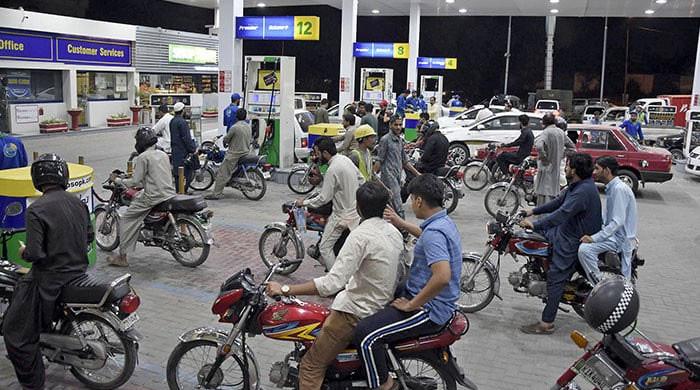 |
| A large number of vehicles stand in a queue to fill their vehicle petrol tanks at a petrol pump in Islamabad, on May 24, 2022. — Online |
Government Raises Diesel Price by Rs2.78/Litre: What Drivers & Transporters Need to Know
From September 16, 2025, Pakistan
increases diesel price to Rs272.77/litre. Discover how this affects
transportation costs, inflation, and daily life.
A large number of vehicles
stand in a queue to fill their vehicle petrol tanks at a petrol pump in
Islamabad, on May 24, 2022. — OnlineISLAMABAD: The federal government has
increased the price of diesel by Rs2.78 per litre for the next fortnight of
September 2025.The revised prices are...
In a move that affects everything from
trucking to vegetable prices, the federal government has raised the price of
diesel by Rs2.78 per litre starting September 16, 2025. The adjustment
comes after a fortnight of deliberations, informed by OGRA’s recommendations,
input from relevant ministries, and shifts in the international oil market.
Previously priced at Rs269.99 per
litre, high-speed diesel (HSD) will now cost Rs272.77. Petrol,
however, remains unchanged, holding steady at Rs264.61 per litre.
At first glance, Rs2.78 might seem like
a small hike—but for sectors that depend heavily on diesel, it can quickly
become a significant cost. Transporters, farmers, heavy machinery operators,
and supply chains for essential goods such as food and staple commodities all
stand to feel the effect.
Diesel powers much of Pakistan’s
backbone of commerce: large trucks, buses, agricultural machines like tractors,
even tube wells. When its price rises, so too do the costs of producing and
transporting crops, moving goods across distance, and maintaining public and
commercial transport. Those increased costs often find their way into consumer
prices—especially for food and essentials.
Middle and lower-middle income families
tend to rely on petrol for their daily vehicle use. Thankfully, the decision to
keep petrol price unchanged offers a temporary sigh of relief for those
commuting in small cars, motorbikes, rickshaws, and tuk-tuks. But these same
families will likely feel ripple effects in food costs and public transport
fare increases triggered by the diesel hike.
Experts point out that diesel price
changes are closely tied to global oil price fluctuations. When crude or
refined fuel prices jump internationally, domestic market adjustments
follow—often with a delay. Add in costs related to logistics, currency
fluctuations, and taxes, and even a few rupees per litre becomes heavy on
operations.
For farmers, the timing is also
critical. Many cultivate crops seasonally and rely on diesel for irrigation
(tube wells), threshing, and transport of harvests to markets. A price increase
in diesel doesn’t just bite during planting—it echoes through every stage of
the agricultural value chain.
Transport companies are likely to pass
along these additional costs to customers. Whether it’s goods in transit or
passengers in buses, fare hikes often follow fuel hikes. For everyday
consumers, this means slightly higher grocery bills, maybe more expensive
delivery charges, and upward pressure on inflation.
While there’s no immediate widespread
protest over the Rs2.78 raise, each price adjustment chips away at disposable
income, especially for lower-income households already squeezed by inflation
and higher utility costs.
In summary, the diesel price hike,
though modest, doesn’t exist in a vacuum. It’s part of a chain reaction—from
oil markets overseas to the cost of a loaf of bread. As Pakistan navigates
international pressures, domestic inflation, and public expectation, each
increment in fuel pricing becomes a delicate balancing act for policymakers.
FAQs
Q1. When does the new diesel price take
effect?
The new rate of Rs272.77 per litre for high-speed diesel begins
September 16, 2025.
Q2. How much is diesel's price being raised?
It’s being increased by Rs2.78 per litre, up from Rs269.99.
Q3. Are petrol prices changing too?
No. Petrol remains unchanged at Rs264.61 per litre.
Q4. Who is most affected by this diesel
price hike?
Transporters, agricultural operations, heavy machinery users, and consumers who rely on those services. Also, those buying food and essentials may see price increases as costs move through the supply chain.
Q5. Why do diesel price hikes usually
lead to inflation?
Diesel powers transport and agriculture. Increased fuel costs raise the cost of moving goods, farming, and production. Those costs get passed on to consumers as higher prices for products and services.
